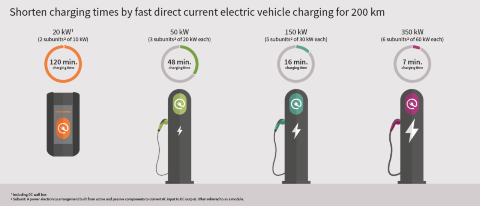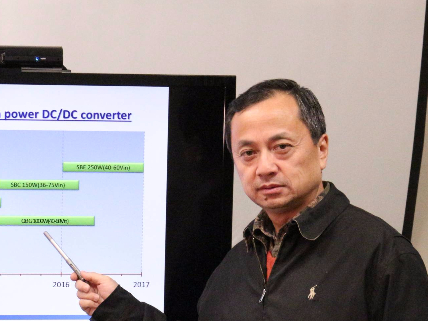Fast EV charger
As e-mobility increasingly becomes part of daily life, there is a growing need for more efficient charging solutions. Fast electric vehicle (EV) charging stations equipped with powerful DC chargers are currently the answer. DC EV chargers are an attractive choice because they allow much faster charging than the standard AC EV ones that many EV owners have at home. Today, a DC charger with 150 kW can put a 200 km charge on an EV in around just 15 minutes. As fast charging and battery technologies continue to evolve and improve in the near future, experts anticipate the charging time to drop even further.
The fast charging market
Some key driving forces are shaping and advancing the EV charging market today. One is stricter government regulation of CO2 emissions. The target to achieve zero emissions by 2050 in most major cities worldwide relies in part on greater EV usage and better fast charging infrastructure. Certainly the high pollution index in cities, detrimental to inhabitants’ health and quality of life, is a motivation to reach this target. Zero or low emission mobility can help stem the prevalence of air pollution related health problems, such as cardiovascular disease and asthma.

The good news: by 2025 over 100 new EVs are set to launch on the market. This step in the direction of improved urban air quality adds pressure to develop and implement the charging infrastructure required to accommodate additional EVs on the road. Finally, as battery manufacturers optimize their cost structures and economies of scale, EV battery costs are decreasing. The result: electric vehicles have never been more attractive to purchase.
Comments: 3
-
 mrpower
mrpowerEV is the future is for sure. Battery-powered EV seems to be the choice so far. But major questions are not answered. If we assume a decent percentage of cars on the street are pure EV, how much electricity would be needed to keep them moving on daily basis? Building up new power generation plants might not be tough, but enhancing the transmission capacity of the grid could be a lot more troublesome. In countries like China, where are you going to put all those charging stations when each car needs 30min or longer to charge even with fast-charging. When one car draws 50kW charging power, how many cars can be charged together at the same location? There is a company in U.S. is making mobile charging stations. Such mobile stations have their own batteries inside and get charged up during non-peak hours and then can be put anywhere to charge cars. Sounds reasonable and seems get well funded by money guys. Trying to even-out the need of electricity over the whole day certainly makes a lot of sense. Will electricity remains to be the long term primary choice of EV energy source is questionable. It's different from gasoline that has been the sole source since automobile is invented. Renewable energy has various forms and something else could take over the spot if it is more friendly to use, such as hydrogen. No matter what source to use, the EVs will always be driven by electric motors and all the DC-DC power conversion needs will be there.
6Reply[dcy] Reply: -
 thomas
thomasGood point!
0Reply -
 mrpower
mrpowerI am replying mrpower's comment and see where it positions.
0Reply
Add a Comment
Please login to comment.Login
Enter your email address and password

